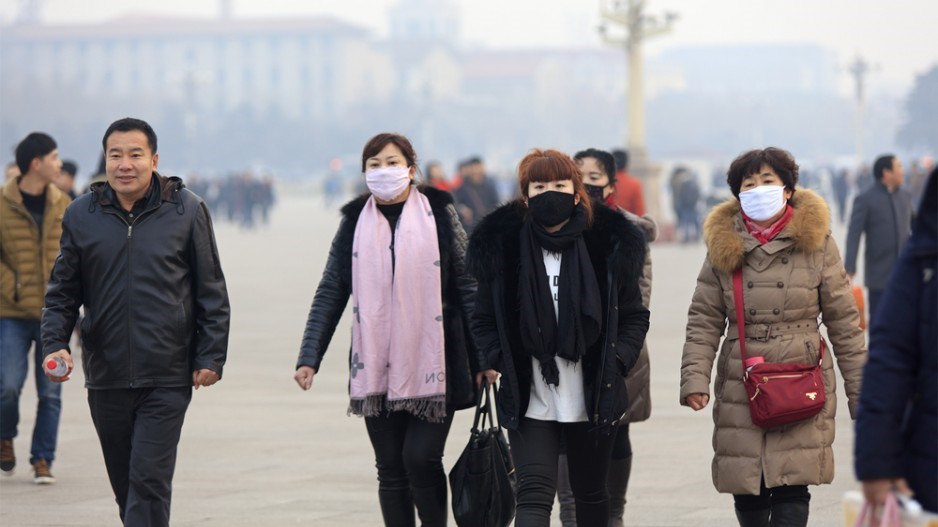Pulling a trailer packed with dive tanks and a compression motor, the three co-founders of Breathe Ezy drive around the scenic mountains and valleys of New Zealand’s South Island collecting air.
Phillip Duval, Xu Yang and Gerry Walmisley are air farmers – or air harvesters as they prefer to be known – making money from fresh air.
They’re not the first – and probably won’t be the last – entrepreneurs to try and turn China’s chronic air pollution into a business opportunity: in their case by selling cans of New Zealand air.
China has been experiencing extremely bad pollution in recent months, with a third of the country’s cities issuing red alerts.
Pollution leads to a range of health problems, and was the cause of more than 1 million deaths in the country in 2012, according to the World Health Organisation.
Air in the capital in terms of PM2.5 – fine particulate matter – exceeded the 400 mark on air quality gauges on Thursday, qualifying it as too “hazardous” to breathe.
Duval, Xu and Walmisley came up with the idea of selling air a year ago during a business trip to Xingtai in Hebei province, a heavily polluted coal mining city, to promote New Zealand wine.
“Yang quipped it would be nice to have some New Zealand air, so that was the germ of the idea,” said Duval, a trained lawyer who’s dabbled in real estate, education and wine exports.
Noting the success of Canadian start-up Vitality Air, which had been selling Canadian air since 2015, and buoyed by New Zealand’s clean image, as portrayed to the world in the Lord of the Rings film trilogy, Christchurch-based Breathe Ezy began selling 600ml air cans in June, each offering around 150 breaths of air.
Users attach a plastic inhaler to the top of the tall blue aerosol cans that sport a picture of the country’s mountains, then press and inhale.
Duval would not reveal exact numbers, but said the company was already profitable, with “tens of thousands” of NZ$35 cans (HK$197) shipped to Hong Kong and China every month.
The company found adapted diving equipment was the best way to compress eight litres of air into 600ml cans.
In 25 minutes, they can fill two dive tanks, or 400 canisters. Sporting ear muffs to drown out the sound of the compressor, the three could pass for gardeners. The air is filtered three times to get rid of any allergens or other impurities such as smoke.
“It’s not a matter of simply saying we’re going to do this and then going out and collecting air in canisters,” Duval said.
A lot of effort went into making sure the China-made cans were up to the job, he said.
About 90 per cent of the product goes to China or Hong Kong, and most of the sales are through distributors overseas, rather than the company’s website or through New Zealand-based tourist stores.
Why are people spending real money on thin air? Duval says there is a psychological benefit.
“You could say it’s as uplifting to some people as going and having a strong cup of beautifully brewed coffee,” he said.
As uplifting as it might be, Duval agrees the product is unlikely to save a life.
“You’d probably have to be breathing fresh air 24 hours a day, seven days a week to overcome the ill effects of serious air pollution,” he said.
Canned air may sound like a joke, but companies selling it were profiting from mainlanders’ fears, said Gao Hongzhi, a senior lecturer in marketing and international business at Victoria University in New Zealand.
“When they can’t escape, what can they do? They want to have a way to relieve the frustration, relieve the tension,” Gao said. “They want a moment of escape.”
Understandably, the industry has its sceptics. A Reddit thread earlier this month discussing Breathe Ezy’s products garnered a range of responses, from “the Chinese are stealing our air!” to “it’s cheap, gimmicky, but it sells.”
Duval compares such attitudes to the scepticism around the bottled water industry when it began.
“People are asking why you would buy a can of air? Air is free. You can go outside and breathe it in. But the reality is that you can’t do that in all parts of the world,” he said.
James Hayes, founder of Pure New Zealand Air, said his products had attracted plenty of interest from wealthy Chinese, especially housewives.
“People think it’s funny because it’s new,” said Hayes, a Christchurch-based software entrepreneur with a medical background.
“Some people just think I’m slightly mad, and some people say ‘oh yeah, I could see how that would take off’. Definitely mixed reactions.”
Hayes’ company, which collects air from four South Island locations, was registered in November 2015 after he heard about Vitality Air.
Hayves believes what sets him apart from competitors is the extra care he takes to pre-empt any future regulations of the industry. He said he had US Food & Drug Administration cleanliness approval and the air was filtered six times.
Hayes’ company’s premium product is called Petrichor, and is air collected in the Otago region and is named after the earthy aroma produced when rain falls after a long dry spell.
“People just go nuts for it,” he said.
Read the original article on the South China Morning Post.




